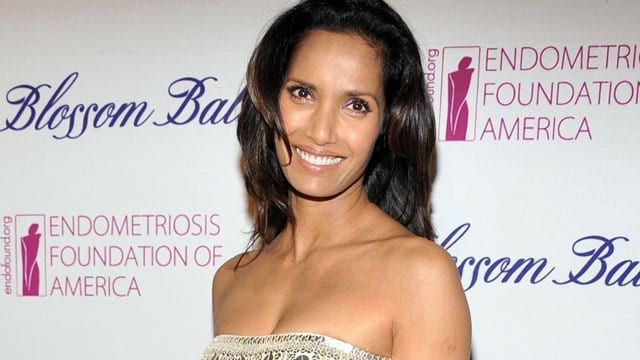 You may know Padma Lakshmi as the beautiful and talented host of Bravo’s hit television show Top Chef. What you may not know about is the tireless advocacy work she does as co-founder of the Endometriosis Foundation of America.
You may know Padma Lakshmi as the beautiful and talented host of Bravo’s hit television show Top Chef. What you may not know about is the tireless advocacy work she does as co-founder of the Endometriosis Foundation of America.
Endometriosis is a painful and chronic condition that affects approximately 176 million women and girls worldwide; 8.5 million in North America alone. Endometriosis is a disease where the tissue that lines and then sheds from the uterus during a normal menstrual cycle, escapes the uterus and then grows on the outside portion of the uterus, the ovaries, the intestines or other parts of the body.
The disease causes internal bleeding which can lead to chronic pelvic pain, infertility, adhesions, inflammation and disruption of the digestive and urinary systems, among other problems. Currently there is no cure for endometriosis, and the only truly effective treatment is surgery, which brings only temporary relief as the endometriosis continues to grow back after it is removed.
Recently, I had the pleasure of hearing Padma talk about her battle with endometriosis. Padma became a mom three years ago after a successful excision surgery to remove her endometriosis. I deeply respect and appreciate her passion for promoting awareness and education for a disease that has had such a profound and lasting impact on my own life.
Padma always looks so poised and put together on television, so it was surprising to me how her story was so similar to all of our stories. Here are excerpts from her story, in her own words:
Misdiagnosis
“The reason I that I got involved with the Endometriosis Foundation of America, at co-founder Dr. Seckin’s insistence and encouragement is because I became very angry at the fact that I personally was only diagnosed with endometriosis at age 36. I’m a college educated woman. I have a lot of resources at my disposal…like healthcare, which is very comprehensive. I have access to the best doctors. And yet, I too fell through the cracks. And I didn’t fall through the cracks because I didn’t know that something was wrong. I didn’t fall through the cracks because I had negligent doctors…they just didn’t know any better. There wasn’t the research and there wasn’t the technology that there is now. I was operated on by a gastro doctor, who had he known that there was a bigger, underlying problem, I am sure he would have given me different care.”
Taking Control of Your Medical Care
“I was diagnosed at 36. I got divorced at 37. And at 38, almost 39, I found myself single and childless, feeling like many women feel in their early 30’s and even early 40’s, that we have squandered or whole-souled some of our life for other parts of our life. There was a lot of guilt and anger I felt at myself for not taking better control of my own body and not going to that second or third gynecologist and say, “Wait a minute, why am I taking handfuls of Vicodin every month?” I should have done that. But I thought that the doctors knew better. Doctors should listen to patients and patients should listen to their own bodies. Pain is your body’s way of telling you something is wrong.”
The Expansive Impact of Endometriosis
“I never like to call our foundation, “A women’s health foundation.” I consider endometriosis a family health issue. Because not only does it affect a woman biologically, it affects her personally. And it affects every person that woman loves, every person she cares for, every person that wants to care for her and loves her. It affects her professional life and all her colleagues. And thereby, it affects us all as a culture and as a society. 1 in every 10 women have endometriosis.”
Sharing Information with Our Younger Generations
“We need to share information with younger women. My mother has a master’s degree in public health. She is a nurse. When I learned about my body, when my mother had that talk about the birds and the bees, she said to me, ‘I had a lot of cramps (and I knew this because I saw her with the heating pad 4-5 days every month) and I’m sure that you probably will too. Some women get it and some don’t. It’s just your lot in life.’ It is not your lot in life. We have to watch what we say to our children as they are forming, not only their bodies, but their relationships with their own bodies and their self-esteem. Imagine if my mother hadn’t been told the same thing by her mother. Imagine if my mother said, ‘If this happens, we are going to find out why, and we’re going to try and fix it as much as we possibly can…so that you can live the life that you should have the opportunity to live.'”
Thank you Padma for fighting for all of us! Your incredible work is truly appreciated.





